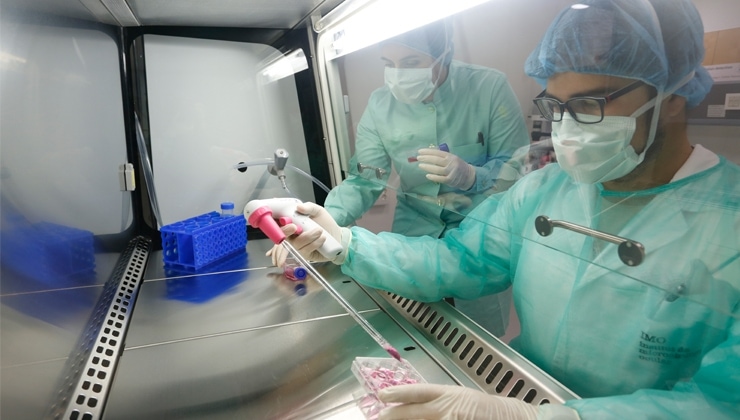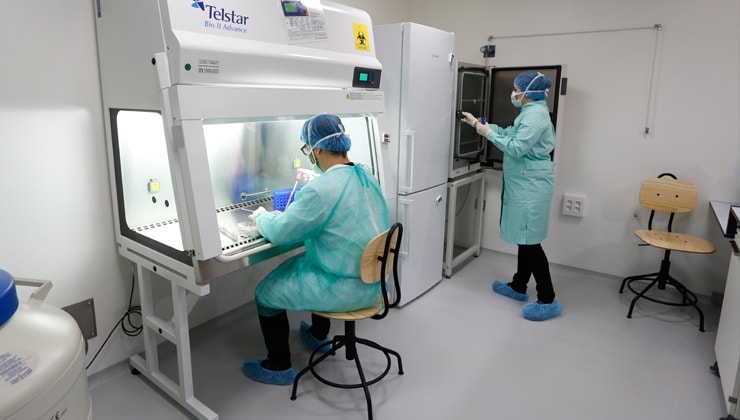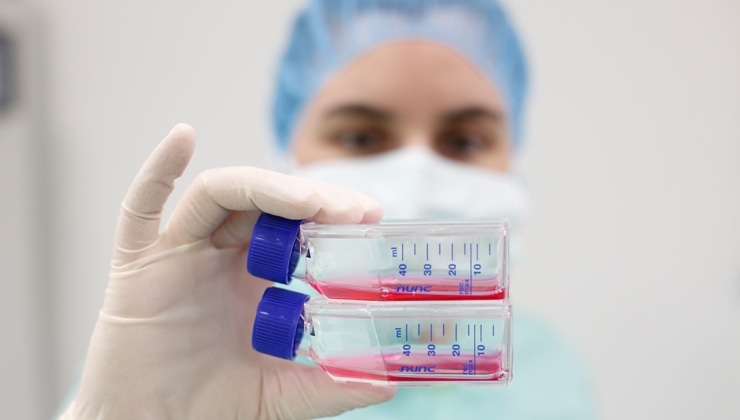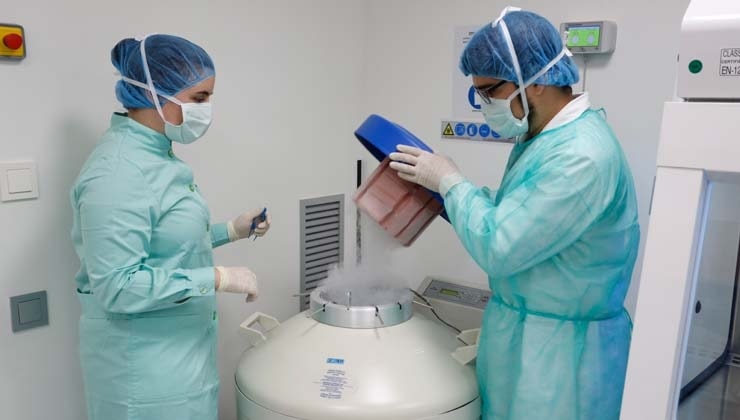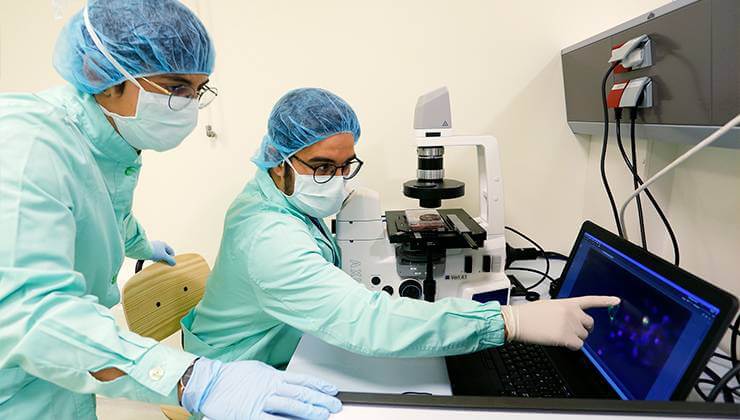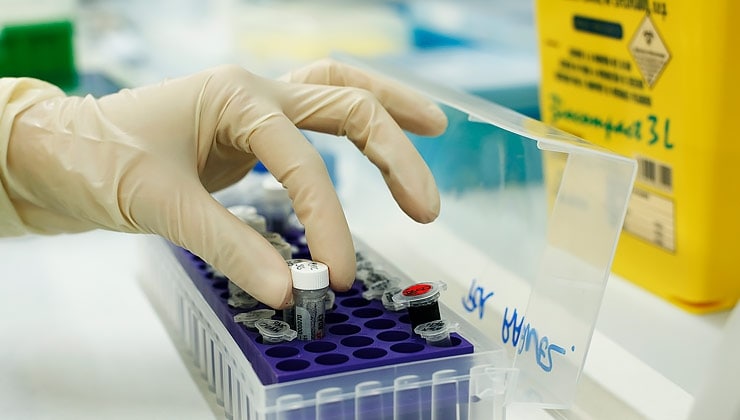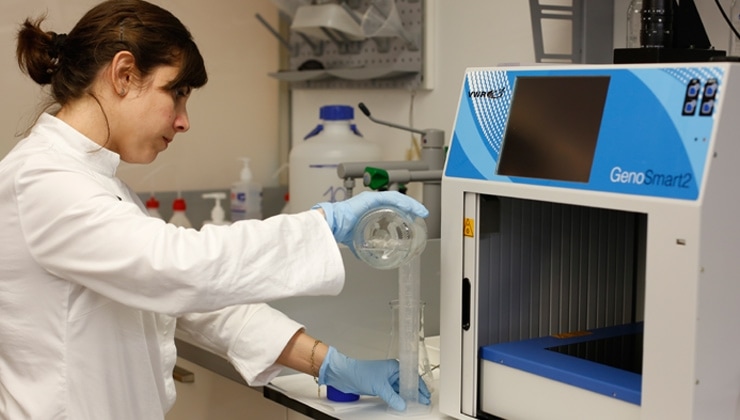Molecular biology laboratory
IMO has a state-of-the-art laboratory to complement the genetic diagnosis service that began in 2009 through a partnership agreement with the University of Barcelona.
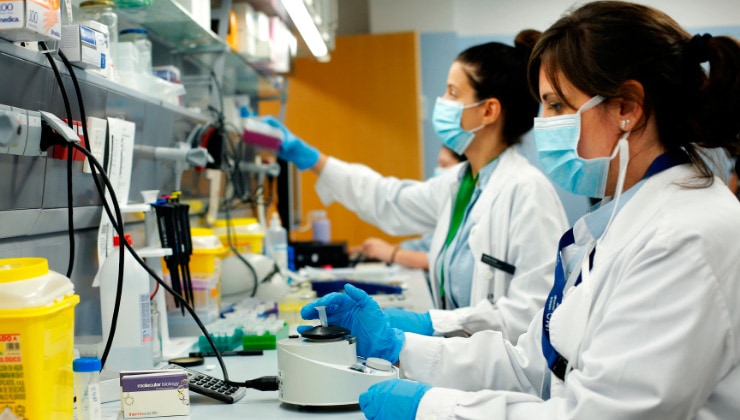
IMO’s facilities include a ground-breaking molecular biology laboratory to give new impetus to the genetic studies that started in 2009 through a partnership agreement with the University of Barcelona. IMO offers a genetic testing service coordinated by Dra. Esther Pomares, for the diagnosis of 30 eye diseases through the molecular analysis of patients with genetic, and therefore hereditary, eye diseases and their families. This is an important department for prevention, since it helps detect presymptomatic patients from affected families who are highly likely to develop a certain disease in the future.
Moreover, the Fundación IMO is about to launch ambitious basic research projects to gain more in-depth knowledge of the molecular bases of certain diseases and use ground-breaking techniques to apply new gene therapies that, within the next decade, will make it possible to combat diseases for which there is currently no cure, such as most retinal dystrophies.
Identifying the risk factors and the likelihood of transmitting an inherited disease
According to Dra. Esther Pomares, the head of the Genetics Department at IMO, “the new laboratory will allow us to improve the service we have been offering patients over the last few years that consists of performing genetic analysis of hereditary eye diseases in order to identify their molecular cause and complement clinical diagnosis”. According to the geneticist, knowledge of the molecular abnormality enables IMO to provide genetic counselling to families, identify the disorder’s pattern of inheritance and reveal the likelihood of transmitting it. It also makes it possible to warn asymptomatic family members, who can pass the disease on without suffering from symptoms. Genetic testing also makes it possible to estimate the prognosis of the disease (i.e. how it will evolve), which directly influences patient expectations and, especially, their treatment, and, finally, to offer prenatal diagnosis.
According to the head of the IMO’s Genetics Department, “studying the disorder’s genetic basis results in greater and better understanding of the disease and helps identify new genes responsible for different diseases, as well as new risk factors not previously associated with these diseases. Genetic counselling for families also allows presymptomatic family members to be diagnosed early and lays the foundations for effective future gene therapy”.
To perform these studies, the ophthalmologist first makes the clinical diagnosis. The genomic DNA extraction is then carried out in the molecular biology laboratory of IMO’s Genetics Department from blood samples provided by the patient and their family members. Once the DNA is purified, direct sequencing of the relevant genes is performed (those that are described as being responsible for a certain genetic disease) to identify the mutation or pathogenic abnormality.
New gene therapies for diseases with no effective treatment
The next step is to launch projects that culminate in translational medicine or, in other words, the clinical application of basic research, an area in which IMO is a pioneer in Spain, where both aspects usually move forward in parallel. “In general, genetic research is conducted in university settings, while few clinics incorporate basic research into their daily activity”, explains Dra. Pomares. According to the geneticist, “the result of developing both aspects simultaneously is a ground-breaking, personalised service for patients who have an identified genetic cause”. She goes on to say: “We will be in a position to provide many of them with new gene therapies within the next decade, a period when we will see cures being found for many diseases that currently have no treatment”.
Meanwhile, the joint work started by ophthalmologists and geneticists in 2009 has already enabled IMO to make significant contributions to the field of genetics and its relationship with ophthalmology. For a start, the teams of researchers from IMO and the UB have identified a gene (PROM1) that causes severe retinitis with macular involvement that had previously only been described in patients with other macular dystrophies. Through this discovery, a new gene has been added to the family of genes that cause retinitis, and the list of candidates to diagnose has been extended to enable prevention and early treatment. It has also made a very valuable contribution to the molecular basis of low incidence macular dystrophy, known as autosomal recessive bestrophinopathy, by describing why some BEST1 gene mutations are associated with this condition.
More than 150 genes
Due to their genetic origin, many eye diseases such as retinitis pigmentosa, Stargardt disease, aniridia, corneal disorders and some forms of glaucoma are inherited. We know about 150 genes that are responsible for retinal dystrophies, 50 of which cause retinitis pigmentosa.
IMO Institute of Ocular Microsurgery
Josep María Lladó, 3
08035 Barcelona
Phone: (+34) 934 000 700
E-mail: international@imo.es
See map on Google Maps
By car
GPS navigator coordinates:
41º 24’ 38” N – 02º 07’ 29” E
Exit 7 of the Ronda de Dalt (mountain side). The clinic has a car park with more than 200 parking spaces.
By bus
Autobus H2: Rotonda de Bellesguard, parada 1540
Autobus 196: Josep Maria Lladó-Bellesguard, parada 3191
Autobuses H2, 123, 196: Ronda de Dalt – Bellesguard, parada 0071
How to arrive at IMO from:
IMO Madrid
C/ Valle de Pinares Llanos, 3
28035 Madrid
Phone: (+34) 910 783 783
See map in Google Maps
Public transport
Metro Lacoma (líne 7)
Autobuses:
- Lines 49 & 64, stop “Senda del Infante”
- Line N21, stop “Metro Lacoma”
Timetables
Patient care:
Monday to Friday, 8 a.m. to 9 p.m.
IMO Andorra
Av. de les Nacions Unides, 17
AD700 Escaldes-Engordany, Andorra
Phone: (+376) 688 55 44
See map in Google Maps
IMO Manresa
C/ Carrasco i Formiguera, 33 (Baixos)
08242 – Manresa
Tel: (+34) 938 749 160
See map in Google Maps
Public transport
FGC. Line R5 & R50 direction Manresa. Station/Stop: Baixador de Manresa
Timetables
Monday to Friday, 09:00 A.M – 07:00 PM
